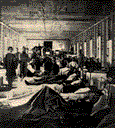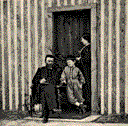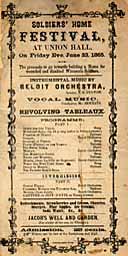

 |
 |
 Cordelia Harvey |
Memphis, Tenn., Dec. 6, 1862.
There are times when the meaning of words seem to fade away; so entirely does our language fail to express the reality. This fact I never so fully realized as when attempting to depict the suffering both mental and physical, which I have witnessed within the last ten days. The heroism of our people is not confined to camp or battlefield, as every daily visitor upon our hospitals can testify. To lie extended upon a narrow cot day after day slowly perishing by disease, surrounded by the dead and dying, far from friends and home, with no hope of seeing either again on earth, with every sensibility tortured by sight and sound, requires more courage, greater power of endurance and firmness of purpose to meet and bear uncomplainingly, than to meet the armed foe in the heat and excitement of battle. The majority of our soldiers bear all this cheerfully, and meet death manfully without a murmur, with folded hands and upward look, a silent prayer to the good Father who is ever near, and whose watchful care is over all His children. - There are a few exceptions. One came under my observation yesterday. A lad only sixteen years of age died a most terrible death of delirium tremens. His sufferings were more horrible than pen can describe. Several have died insane. A few days since, three lads - I believe they were all young soldiers - bought a pie. Soon after eating it two of them died, and one was brought into the hospital raving. I saw him. He was a bright looking boy, some mother's darling son. - He became rational a little, and we hoped he would recover, but he sank away and died last night. They were poisoned. I wrote you that when I came here the idea of interest for any particular State was not to be thought of. This feeling was so strong among the authorities at the hospital, that I found that the only way to reach our own was to do for all. There were between fourteen and fifteen hundred patients. Could I visit them all was a thought that kept me awake one night, but I decided as this was the only way in which our unfortunate Wisconsin soldiers could be reached, I would do it. Col. Allen the medical inspector of General Grant's army, was here, and told me if I would go through the hospital and take the name of every man, his company and regiment, who would never again be fit for service in my judgement - of course I could not judge of disease - he would act upon them at once. I only took the names of cripples, consumptives, feeble old men over sixty years, and boys between the ages of fifteen and eighteen. I do not remember the exact number, but they were hundreds. It required three hard days' work, from early morning until late at night; and by the time I had finished, I had become quite well acquainted with the surgeons, medical inspector, and medical director. I had labored hard for ten days, doing whatever my hands found to do. After this last work was finished, I then said to them; Gentlemen you are pleased to say that I have been of some assistance to you. I have certainly tried to be of service to the poor unfortunates here, without partiality. I now ask that those from my own State be attended to first, so that I can leave here and go to Helena. |
 Convalescent Camp Hospital Ward |
|
 Hospital Steward quarters |
|
 |
|
 PO at Chief Ambulance Officer's Quarters |
Col. Allen answered: "Madam bring forward your cases and they shall be attended to at once". This work I have been and am still doing. I found one Wisconsin man that had lain in hospital nearly five months, he had no description roll, he had been wounded, had typhoid fever, was just able to crawl about, and had written time and again for his papers to his regiment. It was of no use, he could get no answer and had made up his mind to die here. When I first saw him, I said friend have courage, you shall go home within a week, but how I did not know any better than he did, only I knew he should. I laid his case before the medical director and told him that the man never would get his description roll. I knew the situation of his regiment and asked if there was no way of getting him home. He said we can discharge him, but he is a poor man, and how will he get home. I asked if he could not pay him for the time he had been in the hospital. He said he would try. His papers were made out. I took them and sent them to Gen. Hurlbut, he signed them but said, "You can get no money I am afraid, but you may try". I went to the paymaster, got $95.00 and sent the man home rejoicing. |
 |
Another instance, a little boy fourteen years of age, who had never been mustered into the service, but came as a servant to one of our surgeons. His employer had gone and left him sick. He was thrown into hospital. I found him and sent him home at once. He lives in Adams Co., Wis. It was worth a year's hard labor to see the joy of the little fellow. The captain of the steamer Memphis, at my request, took him to St. Louis free. I gave him letters that I think will take him home; if not, they will pay his transportation at the Soldier's Home, and I will pay them when I get to St. Louis. Discharge papers that I take to Gen. Hurlbut are signed at once and sent to me. A boy has just this moment come in with a package of discharges which I took to the General's Headquarters at four o'clock this afternoon. This, you may think, is not very strange; it does not take a man long to sign his name: but if a package of like papers be sent by a messenger, to get back again within a week or ten days it is considered very quick. Packages of discharges all perfected, only wanting the commander's signature, were in General Sherman's office, and had lain there these three months, when Hurlbut came in. So the Medical Director told me. The 23d regiment are in camp here and about twenty sick. I am going to send them some supplies. I visited the camp this afternoon and carried the sick shirts, drawers and socks, but they need more. I can get anything I wish here at the U.S. commission rooms. A gentleman from the Chicago Commission told me today that I could order anything from them that I wished, and it would be forwarded at once. I am grateful to the Governor every day for the position in which he has placed me. The respect, kindness and consideration by the authorities every where that I have been, impresses me with the feeling that I ought to do a great deal more than I am doing. |
 Sherman and His Officers, Memphis, 1862 |